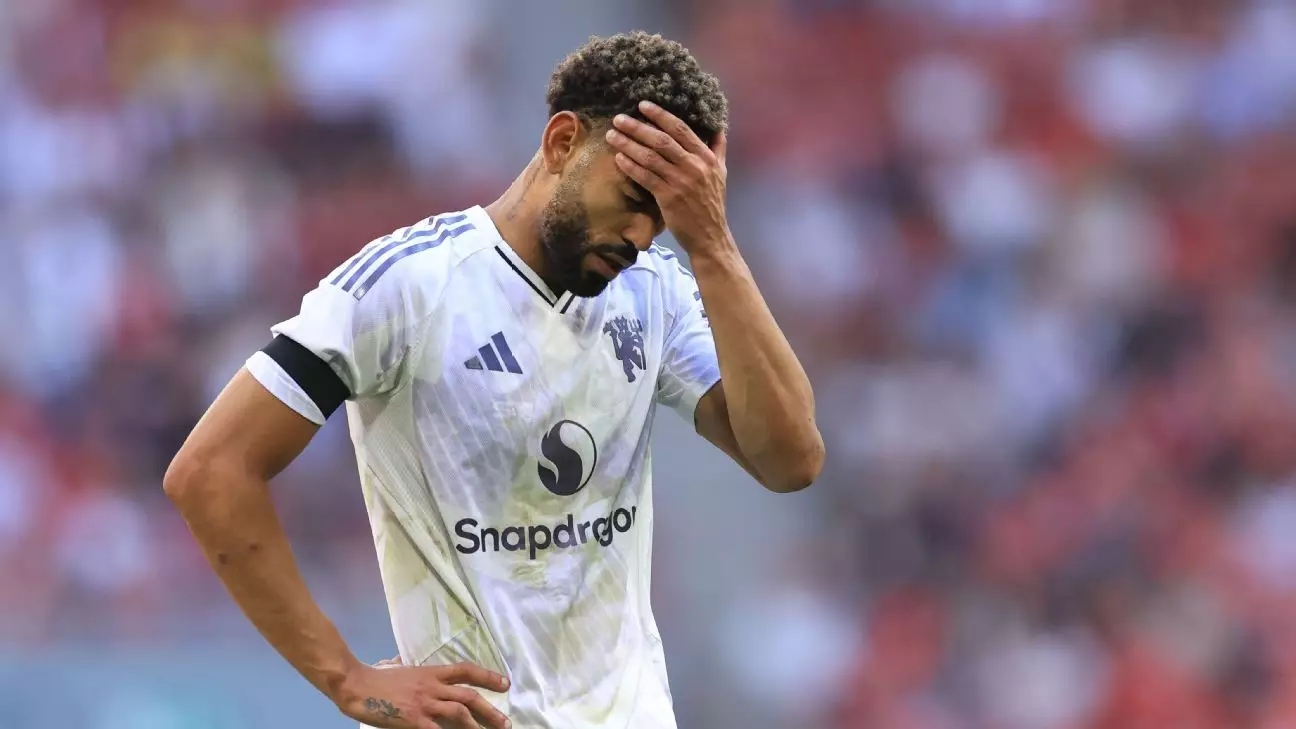Manchester United’s recent preseason performance underscores a significant obstacle in their quest for resurgence: a conspicuous lack of speed and inventive prowess in attack. The goalless draw against Leeds United was a stark reminder that despite the infusion of new talents, the club still grapples with fundamental issues that hinder their competitiveness. Ruben Amorim’s candid assessment points to a deeper structural problem—an offensive stagnation rooted in sluggishness and a failure to innovate in key moments.
This diagnosis goes beyond mere tactical commentaries; it hints at a fundamental misalignment in personnel and style. Modern football demands *velocity* and unpredictable movement; without these, even possession-dominant teams risk becoming predictable and toothless. United’s struggles in the final third reveal a team that, despite possessing talent, cannot translate effort into effective scoring opportunities. Their historical goal tally of just 44 in the Premier League last season further emphasizes that the problem isn’t a lack of talent, but a deficiency in the *dynamism required* to unlock tight defenses.
Emerging Signings as Catalysts for Transformation
The signing of Matheus Cunha, for a club-record fee, was meant to address these gaps. Yet, even early on, the connection between Cunha and the squad’s core playmakers, like Bruno Fernandes, appears tentative. Amorim’s observations suggest that while Cunha embodies the aggressive, in-between-the-lines mentality needed, cohesion remains elusive. The hope rests heavily on his ability to spark a more rapid, fluid attacking style, especially if paired effectively with creative talents like Mason Mount or Kobbie Mainoo.
Furthermore, Bryan Mbeumo’s imminent arrival from Brentford offers a glimmer of hope. His pace could introduce the explosive element urgently needed in United’s attack, transforming static build-up into quick, decisive breaks. However, recruitment alone is not enough; integration and understanding within the tactical framework are paramount. Without a clear, shared understanding and synergy, these talented individuals risk being underutilized or misfitting—an issue that players and coaches alike must urgently address during preseason.
Morale and Mindset Amid Uncertainty
Despite persistent rumors about player departures—most notably Marcus Rashford’s potential move to Barcelona—Amorim remains optimistic about the squad’s unity. His emphasis on a “strong environment” highlights an emerging philosophy: inner cohesion and collective resilience are foundational, especially during turbulent transfer windows. This perspective is vital; in an era where squad stability often correlates with performance, maintaining harmony amidst uncertainty is a strategic asset.
Nevertheless, internal harmony must translate into on-field effectiveness. The current state of the team’s chemistry, especially the anticipated link-up between Cunha and Fernandes, shows that morale alone is insufficient. The true test lies in their ability to convert camaraderie into cohesive attacking patterns—an essential step if they are to elevate their gameplay to a level that challenges top-tier opposition.
Strategic Roadmap: From Preseason to Premier League Battle
Amorim’s focus on preparing the team for their upcoming U.S. tour reveals a pragmatic approach. The series of friendly matches against West Ham, Bournemouth, and Everton presents an invaluable opportunity to integrate new signings, refine tactical understanding, and build chemistry. This period is critical; preseason isn’t solely about fitness but about cultivating a collective identity—especially in attack.
His acknowledgment that “details” must be sharpened indicates an acute awareness that winning requires execution, not just effort or talent. The emphasis on increasing the team’s pace and attacking precision suggests a shift towards a more assertive and unpredictable style, essential for breaking down disciplined defenses. The upcoming fixtures will serve as the testing ground—a crucible where the future of United’s attacking philosophy will begin to take concrete shape.
From Frustration to Fortification
Manchester United stands at a crossroads. They have invested heavily, made strategic signings, and fostered a resilient mindset. Yet, the palpable lack of attacking spark exposes the distance they still need to travel. The preseason offers a fleeting window to correct course, but the true challenge lies in translating laborious training drills and quick-friendly results into sustained, impactful performances against the Premier League’s best.
In truth, United’s trajectory depends heavily on their ability to integrate new signings quickly, develop fluid attacking partnerships, and foster an aggressive, pace-driven style that has become the lifeblood of successful modern teams. The journey may be long, and setbacks are inevitable, but with concerted effort and strategic focus, the Red Devils can reclaim the potency that once defined their attacking legacy. The season ahead promises hurdles, yes—but also the potential for redemption built on speed, ingenuity, and relentless pursuit of excellence.

Leave a Reply